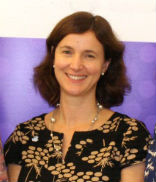
I recently started a new role in the Department – and it doesn’t come more exciting or indeed more challenging than preparing for a G8 Summit meeting. On 11 December the UK will host a Dementia Summit.
Dementia is a cruel condition…
Dementia is a really cruel condition that can lead to a complete loss of self and identity. The Prime Minister has a strong personal commitment to dementia, last year launching the Dementia Challenge. The Summit’s ambition is to galvanise action and stimulate a worldwide fight back against the condition.
Having taken up this post, I now realise how fortunate I’ve been in having little first-hand experience of dementia. Consequently, I’ve greatly benefitted from the connecting programme as it provided me with a chance to spend time in three different services which help people affected by dementia.
First-hand experience
My first two days were spent in the Parker Centre in Edmonton Green, run by Age UK. Everyone I met – staff and carers – were so positive about the centre, which provides day services and domiciliary care, with an impressive degree of flexibility.
For example, day care staff offered a personalised service and were able to get to people’s homes early in the morning when they wanted to get up, and were also able to stay overnight should the carer need some respite care. This service was greatly valued by the carers I met, and the dedication and real heart shown by the team was inspiring. A lot of the staff had moved into care work later in life, and everyone I spoke to said how incredibly worthwhile and satisfying they found their work.
My second visit was to Nightingale House, a care home in Clapham for the Jewish community with 200 residents. The Centre has been able to invest £8 million in a state of the art new wing for 24 residents with dementia, with a beautiful dementia garden. The activity centre here caught my eye with an incredibly creative arts teacher who expertly adapted the activities so that they were stimulating but accessible to everyone there. Once again, the commitment of the staff was impressive – with genuine kindness and patience shown throughout the home.
The on-site health team are proud of the care that they provide – avoiding unnecessary hospital admissions and facilitating speedier discharges. They also manage to largely avoid sedating medication which can be over-used in many care establishments. Unsurprisingly, the home has achieved beacon status for its palliative care.
My final visit was to Kingston Hospital, where improving the Trust’s approach to dementia is a priority. The commitment of many of the staff to this was striking, and the way in which carers were invited to express their views at a conference attended by the Chief Executive was a sign of a robust and open culture.
I was fortunate to join a ward round with one of the consultant gerontologists at the hospital. Kind-hearted and pragmatic, he’s the sort of doctor you’d hope for when a relative or friend is in hospital. He worked closely with his medical and therapeutic team and I was struck by how many people get involved in the care of any single patient. People on the ward were old and frail and, for many, a hospital did not seem the best place to be. But, once admitted it seemed difficult to discharge many of the patients. Dependency and a loss of confidence appeared to build up quickly and home situations, when looked at through the eyes of staff, often appeared risky and inadequate.
Super powers and super heroes
So how has all this left me feeling? I found the visits very upsetting at times, but the different experiences have deepened my understanding of dementia and how it affects people. It’s made me feel really passionate about the work I’m doing on the Summit and its potential to do good.
I’m not afraid to say that the experience also scared me – you hope that your family and friends somehow have magic super powers which give them immunity...but we’re all made of the same stuff and so it’s a problem that needs a real world solution.
So yes, as I witnessed, there are already plenty of super heroes out there doing amazing work – but we also need the super powers to act. I hope that the G8 health ministers, along with the industrialists and researchers attending the Summit, really engage with the themes and take seriously the potential for their decisions to have an enormous positive impact.